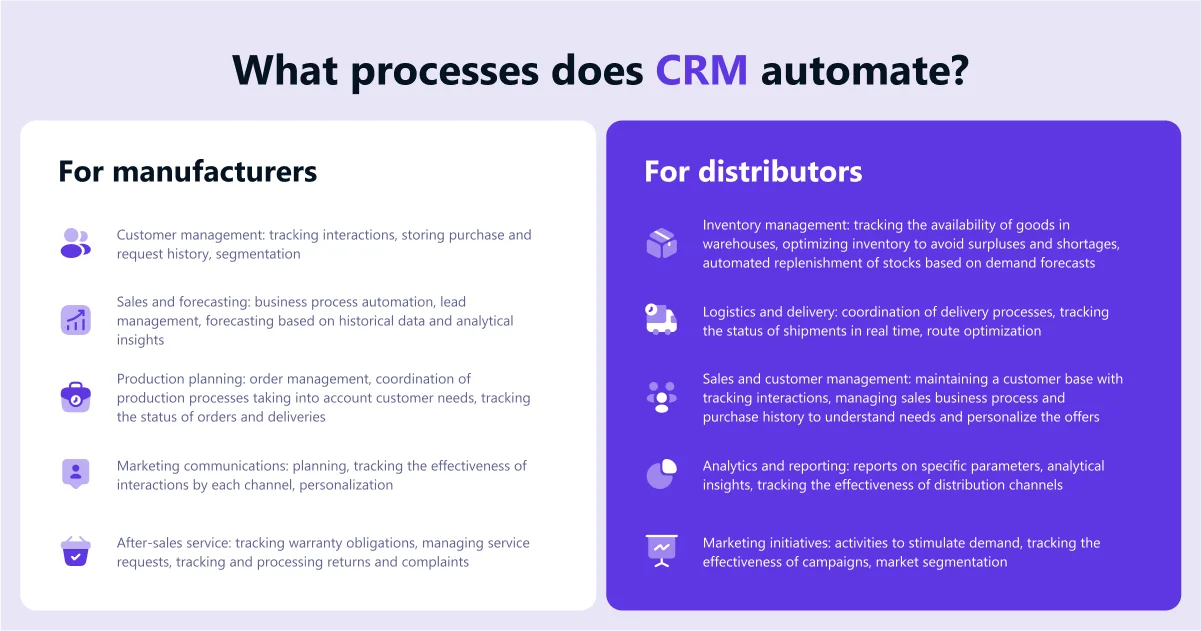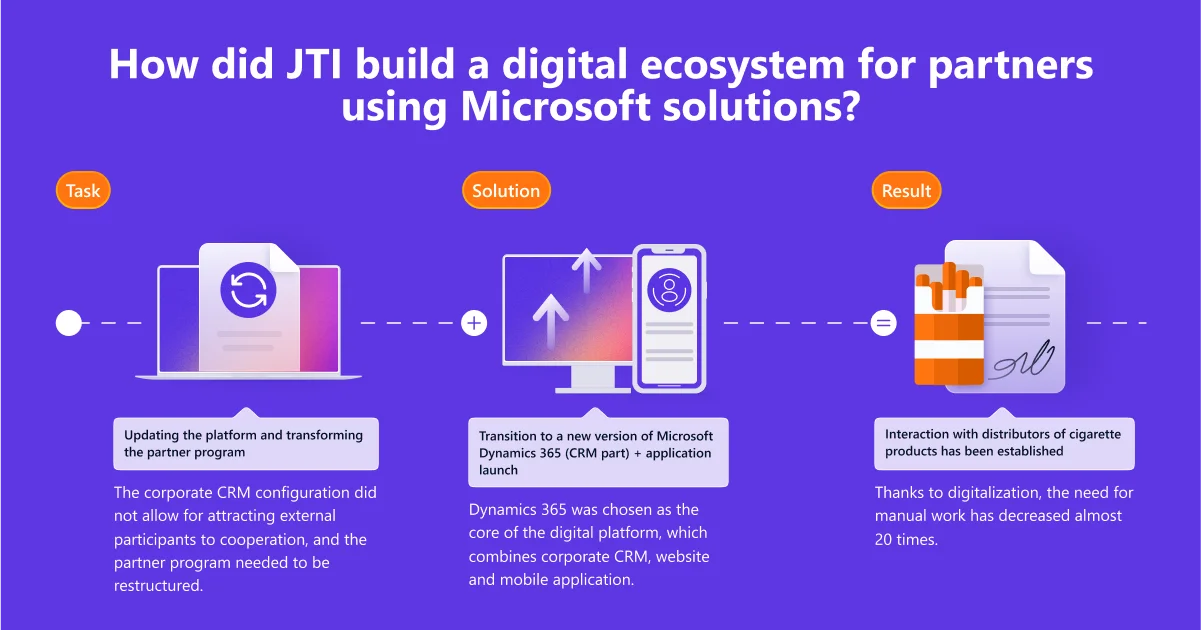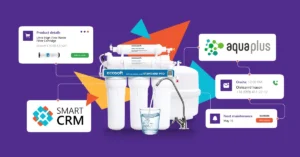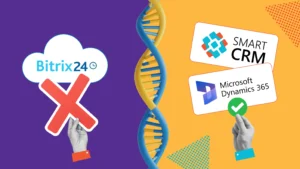CRM system for manufacturers and distributors

Production is not only about working in workshops and shops; it also involves ongoing interactions with clients, partners, and customers, along with accounting, analytics, and adapting strategies to market realities.
In today’s increasingly competitive and volatile business environment, manufacturers and distributors must regularly reassess their strategies, study market trends, and work on improving their processes. While there’s no magic solution to quickly and effectively address all challenges, technology and automation experience can serve as a convenient steering wheel for managing business processes.
Intelligent systems like CRM can also help. Customer Relationship Management is a platform that helps you track, use, and store information about existing and potential customers, accumulate data about your interactions, and keep in touch on a regular basis.
In this article, we aim to answer the question of whether a CRM system is necessary for manufacturers and distributors and how it can positively impact the growth of your business.
How CRM supports production processes
CRM systems tailored for manufacturers and distributors address a range of industry-specific challenges. Key areas of focus include optimizing customer relationship management, improving sales efficiency, enhancing service quality, and automating logistics processes.
In the industrial sector, CRM helps streamline and organize processes, enabling detailed data collection and historical data accumulation. This capability leads to accurate demand forecasting, better resource planning, increased efficiency, and the avoidance of overproduction and financial losses for the business.

Product benefits
CRM systems for manufacturing companies and distributors offer a number of advantages:
- Increase efficiency: automation reduces costs, boosts productivity, and frees employees from routine tasks.
- Improved customer interaction: CRM allows for a deeper understanding of customer needs and delivers a higher level of service.
- Resources optimization: the software optimizes planning and resource usage, minimizing the impact of human error.
- Transparent business processes: every stage of production and distribution can now be monitored and analyzed, leading to process and overall efficiency improvement.
Factors influencing CRM selection
First of all, it’s important to understand your business needs, and this depends not only on the industry but also on the maturity of your business processes, the tools you already use, and whether you are satisfied with them. Analyze your current processes and identify the areas where CRM can be most useful. In addition, you need to clearly define the goals of the implementation.
When selecting the right CRM system, it’s essential to find a product that meets your business needs, offers necessary features, and can scale as your company grows. The CRM system should seamlessly integrate with existing ERP systems, inventory management systems, and other tools used in your company. Open APIs are a plus for easy integration. The ability to customize the CRM system’s functionality and develop unique features tailored to your needs is also a significant advantage.
If your employees have no experience with such tools, they will need additional hours of training and adaptation. This step should not be neglected, as a lack of understanding of the tool can lead to sabotage and significant problems. Ensuring that users are well-prepared to effectively utilize the new system is crucial. Providing ongoing support and guidance after the CRM implementation will also help avoid potential issues and ensure users feel confident using the system.
The confidentiality of your clients’ and partners’ data is a critical component of trust. The CRM system must provide robust protection for both your data and your clients’. Pay attention to compliance with international data protection standards, such as GDPR, CCPA, VCDPA, SOC, HIPAA, and others.
Your budget will largely dictate the options available to you. However, it’s important to note that a functional and reliable system is unlikely to be very cheap. Russian systems, which are still frequently used by businesses, come to mind in this context. To choose the best CRM system, compare the costs and features of various options, as pricing models can vary. A common pricing structure is per-user, but other pricing models also exist. Choose the one that suits you best.
In many cases, quick access to information from any device is not just an advantage but a necessity. A mobile app for accessing the CRM system will allow you to track customer information and make business decisions on the go.
For more detailed information on what CRM is and how to get the most out of implementing a system, read our article.
CRM application in production
CRM systems for production companies and distributors are used to automate and optimize all aspects of the business. This allows you to increase the efficiency of production management, ensure better interaction with customers and partners, improve resource planning, and reduce costs.
CRM software for industry integrates with ERP systems, such as Microsoft Dynamics 365 Business Central, which automates all business processes, including accounting, tax management, operational management, and human resources. Integration with electronic document management systems is also common, helping to reduce paperwork and organize company documents.
CRM can also integrate with various services and providers, such as telephony, payment and delivery services, marketplaces, marketing tools, and more.
Implementation costs
The cost of implementing a CRM system for manufacturing depends on various factors, including company size, business process complexity, the number of users, required functionalities, and whether custom development is needed. Implementing CRM also requires some investment, but the long-term benefits of automating and optimizing business processes significantly exceed the initial costs. In addition, the cost of implementation often includes user training, which in the long run helps the team to adapt to working with the new product faster.
Implementation cases/success stories
For 15 years, SMART business has been helping our clients build innovative businesses by implementing advanced solutions based on AI and modern technologies, including Copilot, Power Platform, Dynamics 365, and Microsoft 365.
Our experience in implementing CRM products for manufacturers is backed by satisfied clients like YURiA-PHARM. We implemented a comprehensive Microsoft Dynamics 365 Sales CRM for this pharmaceutical company. And the experience of the technical side of organizing an online congress for 30,000 participants for YURiA-PHARM is described in our case study.
Additionally, our team updated a previous version of a CRM system and restructured and automated several business processes within the partner program for JTI Ukraine, one of the largest tobacco manufacturers in Ukraine (part of the Japan Tobacco International group of companies). A mobile application has also become an integral part of the new digital ecosystem. Read more about how the manufacturer managed to reduce manual non-intelligent routine labor by nearly 20 times in our case study.

Please note!
Finding a reliable and experienced contractor is equally crucial during the CRM system implementation process. When selecting a partner, consider their understanding of your business processes, experience, and expertise in other industries.
We invite you to explore a wide range of CRM systems based on Microsoft technologies, including the Dynamics 365 platform and our own development, SMART CRM, built on the Microsoft Power Platform. If you are looking for a reliable CRM system and an experienced implementation partner, SMART business is ready to assist you. You can submit a request for a consultation at: sales@smart-it.com



















